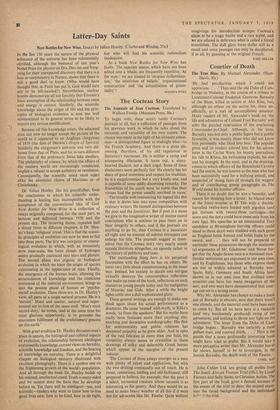The Cocteau Story
To begin with, these aren't really Cocteau's journals at all, but a collection of passages from his previous work in which he talks about the torments and versatility of his own nature. The choice was made in the light of his ultimate admis- sion—a distinguished figure in midnight blue—to the French Academy. And there is a great dis- owning, therefore, of his old reputation as literature's marmoset. He is neither a camp and scampering dilettante, it turns out, a stony- hearted Dadaist, nor a dark angel. Some of these disclaimers seem perfectly fair. He clearly has his share of good intentions and respect for tradition, he is a megalomaniac but a very kindly one, and is capable of some oddly discerning remarks. The friendships of his youth were 'so noble that their virtues had the power usually ascribed to vices.'
The trouble with renouncing his legend like this is that it draws him into open competition with ordinary writers. He himself distinguishes between the poet and the fantaisiste. But if poet is a name we give to the imaginative writer of intense moral convictions who is anxious to pass them on in their integrity to others, and if the journals are anything to go by, then Cocteau is a fantaisiste all right and no amount of solemn retrospect can enlarge his title. The journals suggest in them- selves that the Cocteau story very nearly stands outside literature altogether, an episode rather in the history of publicity and taste.
The outstanding thing here is his perpetual fascination with the effect he has on others. He cares very little about communicating in the usual way. Instead, his anxiety to dazzle and intrigue virtually destroys the commonplace reflections that make up most of the book, reflections on such matters as young people today and the malignities of Mauriac and Gide. After a while the bright lights settle into a dull sophisticated glare.
These general writings are enough to make one think again about his actual performance as a dramatist. He came 'tanned' with myth, in Rilke's words, 'as from the seashore.' But his myths have really been fantasies more than anything else, touching and decorative autobiography. His flair for sentimentality and public relations has deepened palpably as he grew older. And in spite of the real felicities in more than one field, his versatility always seems to crystallise in those drawings of sulky and delectable Greek heroes which appear in the margins of the present volume.
The Cocteau of these essays emerges as a man with plenty of talent and application, but with the two drifting continually out of touch. He is sweet, censorious, tattling and old-fashioned, still prepared to believe, for example, that the poet is a select, tormented creature whose torment is as interesting as his poetry. And there would be no need to make heavy weather of all this if it were not for advocates like Mr. Fowlie. Quite without misgivings his introduction accepts Cocteau's claim to be a tragic healer and a rare stylist, and we are offered in deference what is called a literal translation. The dull glare turns duller still as a result and some passages can only be deciphered, if at all, by guessing at the original French.
KARL MILLER










































 Previous page
Previous page